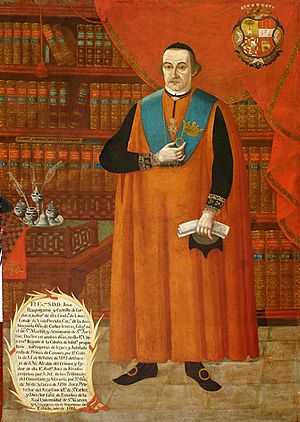José Baquíjano y Carrillo, Count of Vistaflorida facts for kids
José Javier de Baquíjano y Carrillo de Córdoba (born March 12, 1751, in Lima, Peru—died January 24, 1817, in Seville, Spain) was a very important person in Peru's history. He was an economist, a lawyer, a writer, and a politician. He is known as one of the first great thinkers of the Viceroyalty of Peru, which was a Spanish colony at the time.
José was the second son of a noble family. His father was Juan Bautista de Baquíjano y Urigoen, the first Count of Vistaflorida. José later inherited this title from his older brother in 1809, becoming the 3rd Count of Vistaflorida.
He studied law at the University of San Marcos in Lima and earned a special degree called a doctorate. From 1773 to 1776, he traveled to Spain. There, he met other famous thinkers like Pablo de Olavide and Gaspar Melchor de Jovellanos. When he returned to Peru, he worked to protect the rights of Indigenous people and became a law professor.
Contents
The Famous Speech: El elogio a Jáuregui
José Baquíjano became very well-known for a speech he gave in 1780. This speech welcomed the new viceroy, Agustín de Jáuregui, to Lima. The speech was published in 1781 and was called El elogio a Jáuregui (The Praise of Jáuregui).
What made this speech special was that it wasn't just a welcome. It also included strong criticisms of the government's policies. He bravely spoke out against how the government was handling the economy and treating Indigenous people. This was very unusual and bold for the time. He used ideas from famous thinkers like Montesquieu, Raynal, Machiavelli, and Las Casas to support his points. Some officials, like the Royal Inspector José Antonio de Áreche, called his ideas "terrible."
His Ideas on Economy
José Baquíjano was a "mercantilist" thinker when it came to the economy. This means he believed that a country's wealth came from exporting more goods than it imported, especially valuable metals like silver and gold.
However, he was also influenced by some ideas about "free trade," which is when countries can trade with each other without many rules or taxes. Baquíjano thought that free trade and the separation of the Viceroyalty of Río de la Plata (a neighboring colony) were causing economic problems in Peru in the late 1700s. He believed that Peru's economy depended heavily on sending its precious metals to other countries.
Work in Education and Writing
Baquíjano led a group at the University of San Marcos that wanted to make big changes. They wanted to replace old ways of thinking, called Scholasticism, with newer ideas from thinkers like Descartes and Newton. This group also supported the ideas of the Encyclopedists, who believed in sharing knowledge widely, and they fought for freedom of the press.
In 1783, Baquíjano tried to become the head (rector) of the university but lost the election. Even so, he managed to bring his reform ideas to another important school called the Colegio de San Carlos. Later, in 1791, he became the vice-rector of San Marcos.
From 1791 to 1795, he was the editor of an important newspaper called the Mercurio Peruano. In this newspaper, Baquíjano published articles about the history of Lima's high court (the Audiencia), the university, and the famous silver mines in Potosí. He also wrote about Peru's economy. In 1793, he became the president of a group called the Academic Society of Lovers of the Country, which focused on learning and improving Peru.
See also
 In Spanish: José Baquíjano y Carrillo para niños
In Spanish: José Baquíjano y Carrillo para niños
 | Audre Lorde |
 | John Berry Meachum |
 | Ferdinand Lee Barnett |


